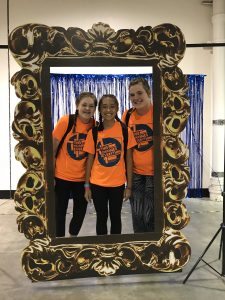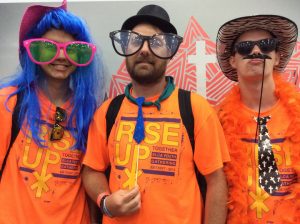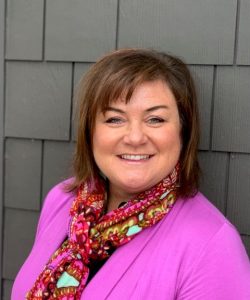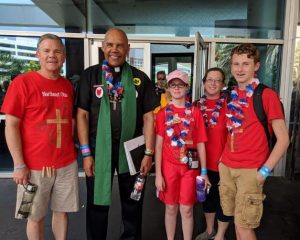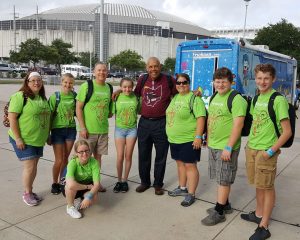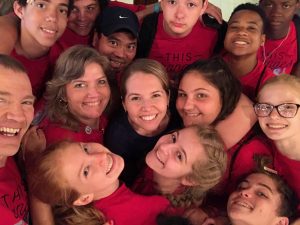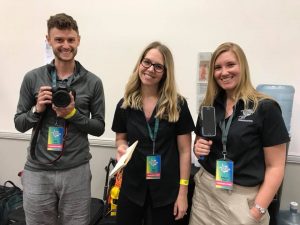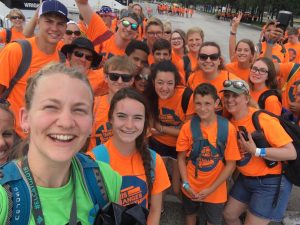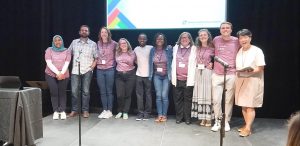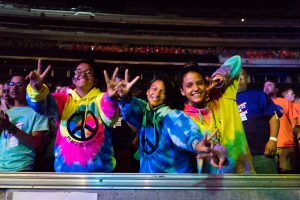On the last full day of the ELCA Youth Gathering, the daily theme was “God’s Hope Changes Everything.” Synod Day, Service Learning, Community Life, and Interactive Learning were taking place in various locations around the city of Houston.
One of the many Service Learning sites was the Houston Food Bank. More than 900 youth participants were hard at work in the facility. They were busy sorting and packing not just food items, but also toiletries and health products. Trini, 16, of Redeemer Lutheran Church in Houston said that the Gathering will leave a lasting impact in the city she calls home. She said, “The Gathering will make Houston a better place by spreading goodness.”
Piny, 16, and Joy, 14, from St. Olaf Lutheran Church in Austin, MN were helping pack food and products at the food bank. With working in the food bank for Service Learning, Piny said she was glad she had the “ability to help others in need. It gives us a chance to stop thinking about ourselves and to help others.”
At their Synod Day, youth in the La Crosse Area Synod enjoyed forging relationships, worshiping and connecting in faith under the theme, “God’s hope changes everything.” Sharice, a teen from the synod, shared her faith story, inspiring her peers with a message of hope: “We are the future of this church.”
It was also Synod Day for the Delaware-Maryland Synod. Some synod youth groups attended Houston’s “Families Belong Together” rally beforehand to protest the separation of undocumented children and their families. In his opening message Bishop William J. Gohl, Jr., told youth there’s power in coming together for this time of community as a synod and “there’s power in inviting others to come inside (the church).” Throughout the afternoon, youth leaders guided their peers through activities and worship.
Back in the NRG Arena, youth were having fun playing with inflatables, singing karaoke, dancing, and relaxing. Ojulu Cham, 18, Our Savior’s Lutheran Church, Austin, MN, especially liked playing games and meeting new friends in Community Life after a morning spent wrapping and packing beans at the Houston Food Bank.
Live Bible study at Community Life were “idle tales”; Rev. Nadia Bolz-Weber, Rev. Jodi Hogue, Rozella Haydée White, and Rachel Kurtz sat down to have a discussion on God’s hope and the Road to Emmaus in Luke’s Gospel. The conversation between these four powerful women today focused on women being the first witnesses to the resurrection, and how the hope of women is how the resurrection came to be known today.
Mass Gathering was an expression of how God’s hope changes everything. The speakers tonight covered intense topics that need to be discussed thoughtfully and honestly within our faith communities.
Stephen Bouman, executive director for ELCA Domestic Mission, opened up the final evening of the Gathering with a heartfelt speech on current issues facing the US and this church, including gun violence in our schools, racism, and the ongoing demonization of refugees and immigrants. Bouman shared how he has seen signs of hope in the work of his church, the ELCA, in its advocacy work, fighting hunger in the US and beyond, building peace globally, and accompanying migrant families and children through its AMMPARO initiative. Kelby Anderson, 16, from Zion Lutheran Church, Iowa City, IA, said he appreciated Bouman’s timely message of hope and how he connected it to current events.
Youth were moved when Jamie Bruesehoff and her 11-year-old daughter, Rebekah, shared their story. Rebekah is transgender. “When I was younger, I was worried and confused. Why did I have to go through all of this?” Rebekah shared. “I’ve come to learn that God does not make mistakes. I was created in the image of God to be me.”
Since claiming her gender identity, Rebekah has went on to speak to lawmakers and others, advocating on behalf of the LGBTQIA+ community, particularly those who are transgender. “Transgender kids are just like other kids,” she said. “We need to be loved and supported.”
As she wrapped up her speech, Rebekah called on youth to make a difference in their own communities and congregations and show others hope. “I hope for a church and world where people are not only welcomed but they are celebrated,” Rebekah said. “Go out. Start something. Help somebody struggling in their community. Cheer them on. Throw them a party. Paint a giant rainbow flag outside. That’s what I want my church to do.”
Faye, 15, Atonement Lutheran Church, Rochester, NY, said, “I really liked (Rebekah’s) message no matter how old you are you can make an impact on someone’s life.”
Maria Rose Belding, executive director of MEANS Database, spoke about her journey to create a national nonprofit database connecting people and organizations with extra food to donate it to nearby hunger nonprofits. She opened up to youth about her anxiety and depression in high school while she was working to create MEANS.
Belding also discussed her sexuality and past trauma. When she came out to her mentor as queer, he raped her. “What happened to me what not my fault, and if this happened to you, it wasn’t yours either,” Belding said. “God’s hope and love and grace are enough for every queer rape survivor, and every hungry person who has been told to just be more responsible, and everybody in recovery from something, and every child and parent torn apart at our border.”
Belding’s message deeply resonated with Katie, from St. Philip Lutheran Church, Raleigh, NC. “Being a woman and knowing those types of experiences and being able to hear (Belding) talk and claim that she knew it wasn’t her fault was really powerful to me,” Davidson said.
Joe Davis, a poet, musician and recent ELCA seminary graduate, inspired youth with a message of hope amid adversity. “I am a Black man and I am speaking in front of one of the whitest church denominations. My very body is the hope of my ancestors, my very presence is a prayer,” he said. “In a world that speaks death to me … my existence is resistance. I am here for a purpose and a reason.”
Davis told you they were here for a purpose and reason, and he encouraged them be bold in their faith. “You may have been told to shut up and sit down but I wanna tell you to stand up and speak out,” he said. “We’re no longer in a church building but we are building church.”
After his talk, Joe Davis said he wanted Gathering participants to remember to “have more reasons to hope than despair. We have to practice hope like a discipline, and it is best practiced in community.”
Ten Avenue North closed out the evening with a spirited performance of songs that touched on God’s love, grace, and hope. Youth were energized and inspired, and many said the concert was their favorite moment of the evening. Isabel, 18, New Creation Lutheran Church, San Jose, CA, appreciated that lead singer, Mike Doney, “was so in touch with the crowd and brought his view of God into it and explained it and it really made sense.”
ELCA Presiding Bishop Elizabeth Eaton expressed that she wanted participants to find a way to not just take the hope expressed at Mass Gathering from this one night. Behind the stage, she said she hoped participants would take the entirety of the Gathering experience home with them with them when they depart Houston. Her hope was for participants to maintain the sense of community as they return to their homes across the ELCA.
Follow the 2018 ELCA Youth Gathering on social media:
Don’t forget to follow the hashtag #ELCAYG2018!
Follow instructions to download the ELCA Youth Gathering app here.


